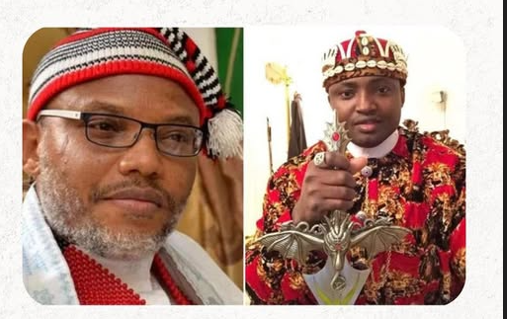
As Nigeria prepares for the pivotal October 10, 2025 judgment on the “no-case” submission by Nnamdi Kanu’s defense team, the conviction of Simon Ekpa in faraway Finland has injected new fuel into a long-burning fire. For the Indigenous People of Biafra (IPOB), the timing of Ekpa’s sentencing is more than just coincidental—it is, in their words, a “manufactured smokescreen” aimed at prejudicing the judiciary and the public against Kanu.
But is that claim credible? Can we listen to IPOB’s argument objectively, or is this simply a calculated deflection by a movement under pressure?
Ekpa and Kanu: Two Agitators, Two Realities
At first glance, the parallels between Simon Ekpa and Nnamdi Kanu appear undeniable. Both men have pushed for Biafran independence, both command significant online followings, and both have been accused of inciting unrest in Nigeria’s Southeast.
But peel back the surface, and the divergence becomes stark.
While Kanu is the recognized leader of IPOB and has operated largely within the framework of non-violent agitation (at least in IPOB’s official narrative), Simon Ekpa has taken a more militant route, allegedly commanding violent enforcement of illegal sit-at-home orders that have paralyzed life and led to bloodshed across Igboland. His conviction in Finland on terrorism-related charges is not a matter of ideology—it is a legal fact, grounded in judicial proceedings outside Nigeria’s jurisdiction.
Furthermore, IPOB has officially distanced itself from Ekpa, pointing out that even in Finnish court, he disowned IPOB and declared himself a “content creator.” If true, this significantly weakens any attempt to conflate the two men.
The Smokescreen Theory: Distraction or Strategy?
IPOB argues that the Nigerian government is seizing on Ekpa’s conviction to create a narrative that equates all pro-Biafra activism with terrorism. This, they claim, is an attempt to bias the judiciary ahead of Kanu’s October 10 hearing.
It’s not an outlandish concern.
In a political environment where narratives often trump nuance, the danger of guilt by association is very real. Public officials celebrating Ekpa’s sentencing could be perceived as an attempt to delegitimize IPOB’s broader cause—even if IPOB itself had nothing to do with Ekpa’s actions. The concern, therefore, is less about legal linkage and more about political messaging. The government may be drawing an implicit line: Biafra equals violence, thereby justifying harsh legal and military actions.
But is that truly a smokescreen, or is it part of a broader counterinsurgency effort?
Government Responsibility: Avoiding Oversimplification
The Nigerian state has a legitimate right—and indeed a duty—to protect its territorial integrity. Armed groups, incitement to violence, and widespread insecurity in the Southeast are serious issues that require action. However, effective governance must avoid conflating criminality with legitimate dissent.
By celebrating Ekpa’s conviction while continuing to detain Nnamdi Kanu without conclusive judgment, the government risks sending a troubling message: that it does not distinguish between peaceful agitation and violent extremism. In such an environment, public trust in due process erodes, and the courts appear not as arbiters of justice but as tools of the executive.
If Kanu is to face judgment, it must be on the strength of evidence presented—not on the public perception shaped by unrelated cases abroad.
The Need for Judicial Independence and Narrative Clarity
IPOB’s warning about a potential smokescreen may sound conspiratorial to some, but it is rooted in a genuine concern about fairness, legal integrity, and the shaping of public opinion.
The Nigerian government must tread carefully. Using Ekpa’s conviction to build a narrative around Kanu’s guilt risks not only judicial interference but also further alienation of a region already feeling marginalized. IPOB, too, must maintain internal consistency—if it distances itself from violent actors, it must also be willing to operate transparently and within lawful means.
In the end, justice for Nnamdi Kanu—or anyone—must be rooted not in politics or perception, but in law. And justice, we must remember, must not only be done but be seen to be done.




